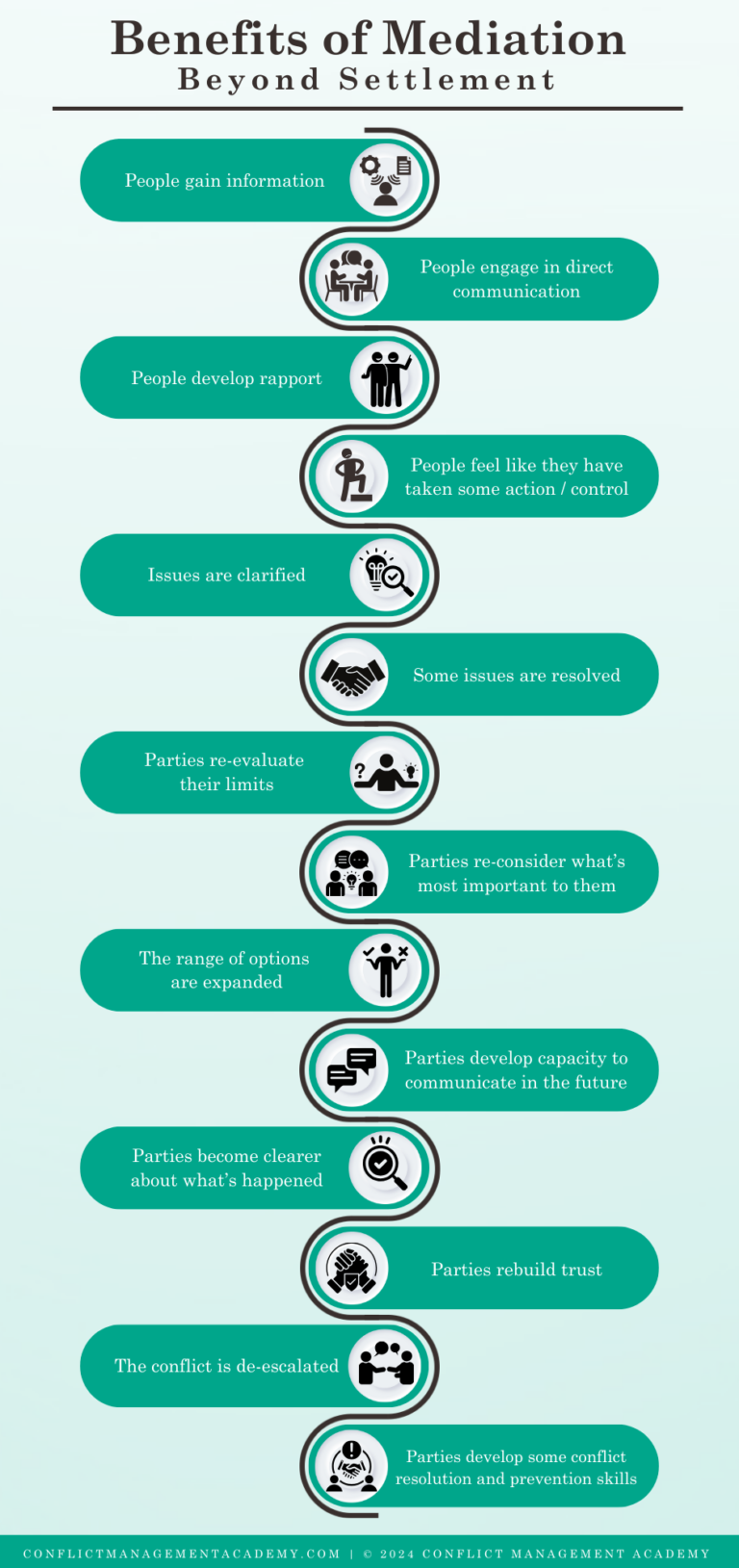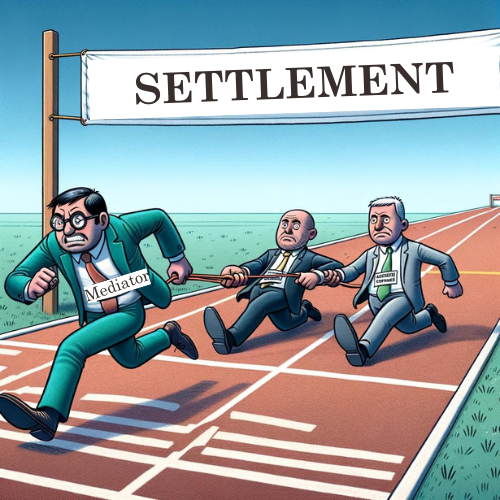In our Beyond the Table course, we have an entire module on ethics. But it doesn’t focus on the ethics of practice in the sense of what we do in the mediation or coaching room with the client. Rather, it focuses on the ethics of doing business in the conflict services field. We look at lots of different aspects of ethical business, including marketing to people who might be especially vulnerable, transparency in marketing, and ethical considerations related to using testimonials. In this article, I’ll share some of the points we discuss about marketing settlement rates.
The new AMDRAS standards (coming into effect in Australia on 1 July 2025, with transition rules from 1 July 2024) include the domain “Professional Ethics and Responsibilities”. This section includes the requirement that mediators represent their services and competence honestly and transparently, and that mediators do not “guarantee results or outcomes from the proposed process”.
While I doubt any mediator would directly advertise the fact that they guarantee settlement, some do advertise their settlement rates (e.g. 90% of my clients settle their conflict). Some take a more generic approach (e.g. “Research shows that more than 90% of people who participate in mediation settle their disputes”). Others publish on their website testimonials from former clients who have settled their conflicts by working with that practitioner, which might imply that settlement is what the practitioner is offering (and/or values as the best outcome).

While settlement is one indicator of the value of a conflict-related service, in many ways the fact that a matter settled is not very informative, and can even be misleading. Accordingly, advertising settlement or success rates, whether directly or indirectly, by mediators can raise several ethical considerations.
What does it mean to say that a matter has ‘settled’?
Whether a matter has been ‘settled’ is something that is by no means clear in every case. While it might be possible to say that in a case currently pending litigation, the fact that the parties decide to make an agreement to no longer proceed to trial, the matter has ‘settled’. However, this doesn’t necessarily mean that each parties’ interests have been satisfied, or that there are no unresolved issues; it simply means that the parties have decided not to proceed to court.
Even in matters that do not have litigation pending, the fact that people choose to ‘draw a line in the sand’ and to stop engaging in a particular conflict, does not mean that the conflict has been settled.
Eisenberg and Lanvers explain that, perhaps because relatively little systematic information is available about settlements, discussions of settlement rates tend to be overly simplistic. The quest for a single settlement rate, or even a single reasonable definition of settlement, may be futile. It’s also hard for prospective clients to check a mediator’s statements about settlement rates, as due to confidentiality, there’s no way to check.
Eisenberg and Lanvers also caution that when discussing settlement rates, it’s important to carefully articulate the purpose for which settlement rates are of interest. When considering marketing a service’s settlement rate, consider why you believe this information will be useful to prospective clients, and what conclusions they may draw from it.

Success rates are not indicative of mediator quality
Advertising success rates (directly or indirectly) can give potential clients unrealistic expectations, of the mediator, of what the process can offer, and of themselves.
A high success rate doesn’t necessarily indicate that someone is an excellent mediator. It might, for example, mean that they only take on simple cases that are likely to be resolved. As Frank Sanders notes, a mediator with a high success rate in straightforward cases may not be as effective in more complex disputes. A high settlement rate might mean that the practitioner pushes clients towards settlement (possibly when it is not in their best interests).
Roger Levitt explains that while a mediator’s high success rate will seem appealing, it’s not the only factor to consider in choosing a mediator. Other considerations are experience, technical knowledge, and mediation approach. These are also things that should be transparently shared with prospective clients.

Success rates are not indicative of mediator quality
Advertising success rates (directly or indirectly) can give potential clients unrealistic expectations, of the mediator, of what the process can offer, and of themselves.
A high success rate doesn’t necessarily indicate that someone is an excellent mediator. It might, for example, mean that they only take on simple cases that are likely to be resolved. As Frank Sanders notes, a mediator with a high success rate in straightforward cases may not be as effective in more complex disputes. A high settlement rate might mean that the practitioner pushes clients towards settlement (possibly when it is not in their best interests).
Roger Levitt explains that while a mediator’s high success rate will seem appealing, it’s not the only factor to consider in choosing a mediator. Other considerations are experience, technical knowledge, and mediation approach. These are also things that should be transparently shared with prospective clients.

Emphasising success can create undue pressure
Advertising success rates can also create undue pressure on parties to reach settlements, potentially compromising the quality and fairness of the mediation process. In some cases, settlement is in fact a poor outcome. For example, where one or both parties feel coerced into agreement, or when the agreement reached is in fact not the best outcome possible for either or both.
Also, even if the agreement is objectively “a good one”, parties may be dissatisfied with the process of reaching it. They may feel disrespected, coerced, not listened to, patronised. Frank Sanders cautions that an emphasis on settlement overlooks the importance of process. Research shows that party satisfaction rests as much on the quality of the mediation process as on whether a settlement is reached.
Frank Sanders states that, even if reaching a settlement is taken to be the primary goal of mediation, the costs of mediation versus other methods of reaching settlement must be considered.
CONCLUSION
Instead of advertising settlement rates, or promoting settlement as the main benefit of processes such as mediation, consider how you might inform prospective clients of the broader range of outcomes and benefits of mediation.

Are you a passionate conflict management professional eager to develop a thriving practice?
Our course is specifically crafted to address the unique challenges and opportunities within the conflict resolution field. Benefit from the insights of industry experts who have successfully established and scaled their conflict management businesses. Engage in practical exercises, case studies, and collaborative discussions to apply your newfound knowledge in real-world scenarios.
As you proceed through the course, you will be supported by coaches and mentors who can help you to apply your learning to your own specific situation and aspirations. By the end of the course you will have a complete business plan and a clear map for your future development.
Find out more about our Beyond the Table course here: https://conflictmanagementacademy.com/beyond-the-table-course

Roger Levitt, How important is a mediator’s success rate? 18 December 2017
https://www.linkedin.com/pulse/how-important-mediators-success-rate-roger-levitt
Frank Sander (1995) The Obsession with Settlement Rates, Negotiation Journal 11: 329.
Allan J. Stitt, A “Failed” Mediation
https://adrchambers.com/news-articles/commentary/a-failed-mediation/
William Ross (2000) Measuring success in mediation, The Mediation Journal 1(1):1-16.
https://minds.wisconsin.edu/handle/1793/38211
Alexander Oddy (2011) What is the definition of success in mediation?
Theodore Eisenberg and Charlotte Lanvers (2009) What is the settlement rate and why should we care? Journal of Empirical Legal Studies 6(1):111-146. http://scholarship.law.cornell.edu/facpub/203 .
